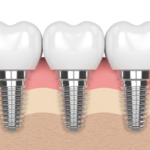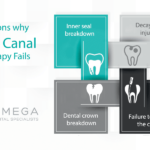Is There an Alternative to Root Canal Treatment?
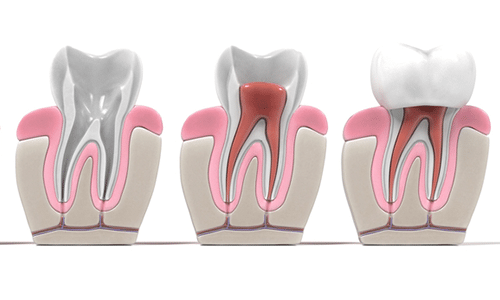
Table of Contents
Teeth Extraction An Alternative to Root Canal
Root canals and removing teeth are generally accepted procedures that dental clinicians can use to help patients with damaged teeth or teeth that may be infected and causing pain. When one compares whether to receive a root canal or an extraction, the decision is often difficult and understanding more about each procedure can be very helpful in making a choice.
If root canal treatment is possible, saving your natural tooth is always the best option. There is a couple of options available to replace missing teeth, but nothing can completely replace a natural tooth. The alternative treatments usually cost more than a root canal. Dentures and dental bridge can cause you to avoid certain foods or even change the way you speak. Root canal treated teeth will last for your life.
Advantages of Choosing a Root Canal Treatment:
- Retain proper chewing and biting force
- Assure a natural appearance
- Protect other teeth from excessive wear
Regenerative Endodontics
Young patients are not a candidate for implants or dental bridge, because they’re still growing outcome of dental implant treatments are unfavorable. Managing inflamed or necrotic pulp of immature permanent teeth can be very challenging, particularly because the root system was not fully formed, difficult to debride and the dentinal walls are easily fractured. There is a possibility to regenerate the damaged dental pulp and give the tooth to continue growing to fully formed tooth.
Why Do I Need A Root Canal?
There are many reasons why a patient may choose root canal as a preferred treatment when a tooth is diseased or injured. The crown of the tooth is primarily made up of a layer of hard white enamel. Within the enamel is a thicker dentine layer. These hard layers are intended to protect the soft innermost tissue of the tooth known as the pulp. The dental pulp is rich with nerves and blood vessels that extend from the crown all the way to the tip of the root.
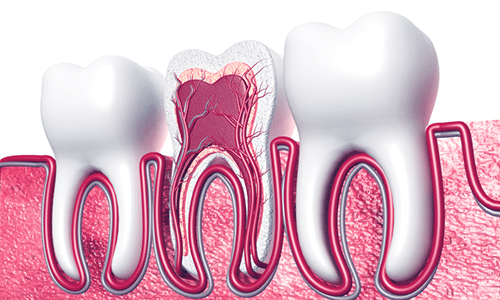
A root canal treatment is a unique type of dental treatment that involves removing the pulp tissue when has become inflamed or infected. There are many reasons why the pulp tissue would become inflamed or infected. For example, deep chronic decay or an extensive restoration process that has penetrated the pulp or cracked or fractured the tooth may indeed cause the dental pulp to become compromised. Trauma from accidents can cause the same results. Even cases where excessive wear has worn down the enamel and dentine can lead to the pulp being exposed. Further, periodontal gum disease or other severe types of gum disease can also result in an exposure of the pulp. In short, anytime there is exposure of the pulp resulting in decay, root canal treatment may be one of the best solutions.
When the pulp within the tooth has been compromised for some reason, there are usually important signs that damage has occurred. This includes everything from swelling to pain and prolonged sensitivity to cold or heat. Also, a discolored tooth, tenderness or a constant bad taste in the mouth could all be indicators of internal tooth damage. Conversely, there are cases where there are no symptoms indicating that the pulp is indeed inflamed or infected. It should be noted that internal tooth decay of this nature left untreated can eventually cause severe pain and swelling as well as even loss of supporting bone mass.
What Is The Advantage of Root Canal?
Root canal treatment is known as endodontic treatment and has successfully saved teeth over the decades with great consistency. Most importantly, many of these teeth that have been treated with root canal techniques have been saved so that extraction is not necessary. Best of all, a tooth that has been treated with root canal techniques can function normally and can be maintained like any other ordinary tooth. Simple home-based routine oral hygiene and dental care are typically all that is required. A tooth that has had a root canal will function normally in every respect.
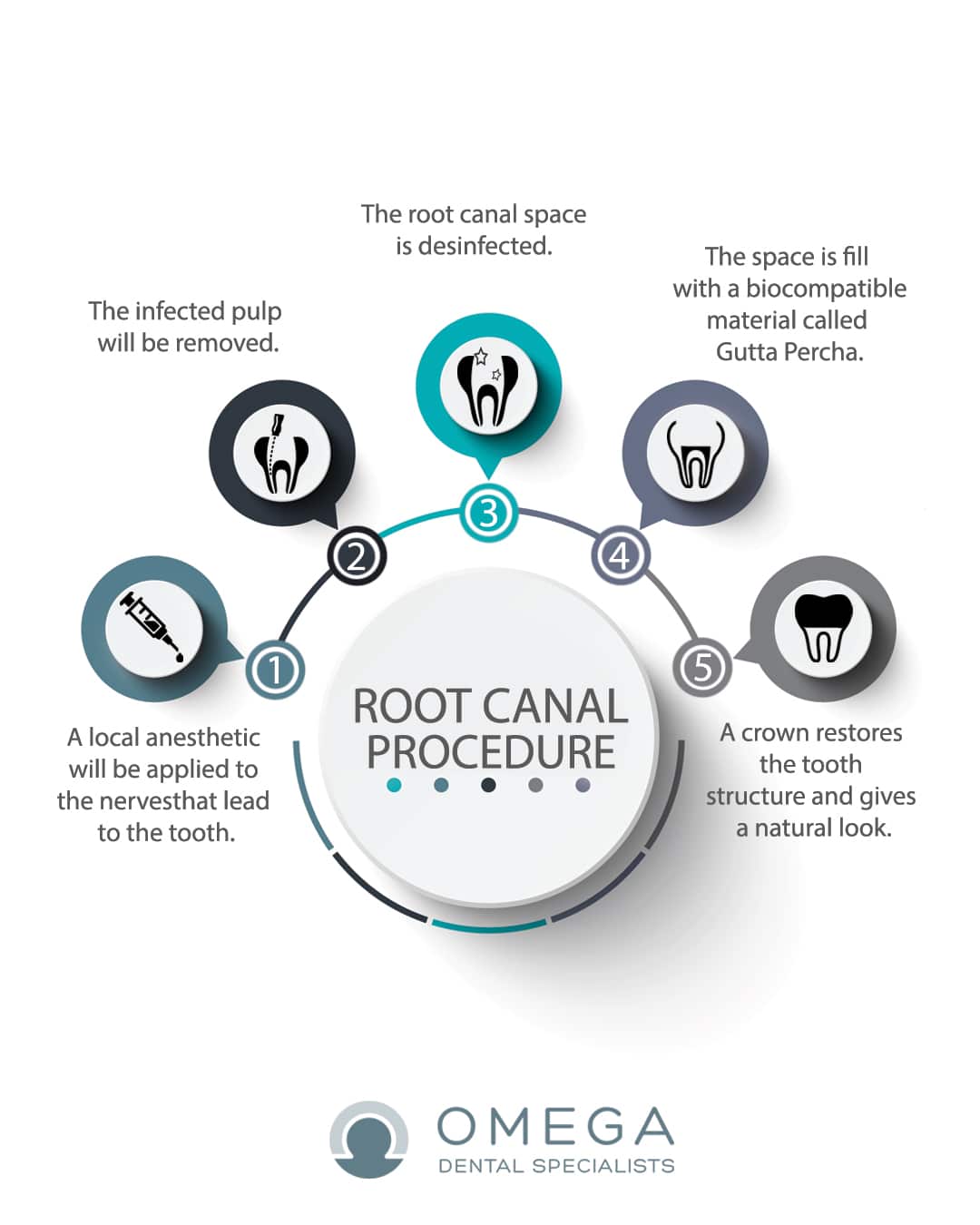
How Painful is Root Canal?
Contrary to what many people have heard, root canal treatment is considered virtually painless in today’s modern world of dentistry. Because the latest in anesthesia is used during treatment, there is essentially no pain. After treatment, there may be slight sensitivity or tenderness for a few days. This is due to normal inflammation of the surrounding tissue. In most cases, this discomfort can be addressed by taking mild painkillers that are available over-the-counter. Patients should know that if pain is severe or persists or swelling that is severe occurs that they should contact their dental care provider immediately.
Understanding How Root Canal Treatment Works
The process is relatively straightforward in that infected or inflamed pulp is removed in a few key steps. The patient is given local anesthesia, and an opening is made in the crown of the patient’s tooth. This allows for easy access to the infected or inflamed pulp. The endodontist then uses a specially designed small rotary file to clean the root canal and do any necessary shaping and forming so that it can be properly sealed. The canal is continuously flushed with an antibacterial solution to ensure that there is no infection. In later stages of the treatment, the tooth canal is filled with inert material and sealed.
After successful route canal treatment, the patient receives a crown or a permanent filling to complete the process. This type of therapy can be done in a single visit or multiple treatments depending on the patient’s unique situation. After a root canal treatment is completed, the patient typically returns later for x-rays to determine the success of the procedure and confirm that normal healing has occurred.
Permanent Tooth Restoration
Finally, the patient is informed on how to care for a tooth that has been root canal treated. For example, it is critical to avoid biting or chewing until the tooth has been fully and permanently restored with either a crown or filling. This aspect of root canal treatment must be taken seriously because excessive pressure during any stage of the treatment may result in a fractured or cracked tooth. The tooth must be restored properly as soon as possible as a way to avoid this type of problem. The good news is that virtually all teeth that are treated through Endodontics or root canal will last as long if not longer than natural teeth once final restoration has been completed.
Good Oral Hygiene Once Treatment Is Finished
As an added note, your endodontist will recommend that you practice good oral hygiene once your treatment is finished. This includes flossing and brushing on a regular schedule at home. A root canal filled tooth is just as prone to periodontal disease and decay as a natural tooth. Always plan to have regular dental visits so that any work that has been done can be checked at scheduled intervals. Modern dentistry has become extremely advanced in recent years giving dental patients more options and more choices than ever before. Root canal therapy is just one more example of how advanced dentistry can help people of all ages enjoy better dental health and wellbeing.
-
November 06, 2019Use Endodontic Microscope in Contemporary Endodontics
-
November 10, 2018Is It Possible to Fix a Cracked Tooth?
-
November 10, 2018Is There an Alternative to Root Canal Treatment?
-
November 03, 2018Abuse of Antibiotics in Dentistry
-
October 31, 2018Can Root Canal Cause Sinus Infection?
-
August 13, 2018What Is The Apexification?

